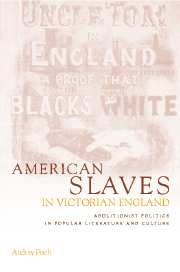Book contents
- Frontmatter
- Contents
- Acknowledgments
- Introduction:Communicating “a correct knowledge of American Slavery”: J. B. Estlin and the “breeder” in Frederick Douglass's Narrative
- 1 “Exhibiting Uncle Tom in some shape or other”: the commercialization and reception of Uncle Tom's Cabin in England
- 2 Abolition as a “step to reform in our kingdom”: Chartism, “white slaves,” and a new “Uncle Tom” in England
- 3 “Repetitious accounts so piteous and so harrowing”: the ideological work of American slave narratives in England
- 4 “Negrophilism” and nationalism: the spectacle of the African-American abolitionist
- Epilogue:“How cautious and calculating”: English audiences and the impostor, Reuben Nixon
- Notes
- Bibliography
- Index
Epilogue:“How cautious and calculating”: English audiences and the impostor, Reuben Nixon
Published online by Cambridge University Press: 20 February 2010
- Frontmatter
- Contents
- Acknowledgments
- Introduction:Communicating “a correct knowledge of American Slavery”: J. B. Estlin and the “breeder” in Frederick Douglass's Narrative
- 1 “Exhibiting Uncle Tom in some shape or other”: the commercialization and reception of Uncle Tom's Cabin in England
- 2 Abolition as a “step to reform in our kingdom”: Chartism, “white slaves,” and a new “Uncle Tom” in England
- 3 “Repetitious accounts so piteous and so harrowing”: the ideological work of American slave narratives in England
- 4 “Negrophilism” and nationalism: the spectacle of the African-American abolitionist
- Epilogue:“How cautious and calculating”: English audiences and the impostor, Reuben Nixon
- Notes
- Bibliography
- Index
Summary
On December 26, 1845, addressing an anti-slavery meeting in Belfast, Frederick Douglass diverged from the subject of American slavery to speak about accusations being levelled against him.1 An article entitled “Anti-Slavery Meeting” carried in the Banner Of Ulster records Douglass's remarks as follows:
[Douglass] craved permission to say a few words in reference to his own position. Attempts were being made to destroy his influence, by insinuating that he was not what he pretended to be, and could not exhibit any credentials from persons of respectability. He was, however, no impostor, and those who made the charge ought not to do so under the curtain, but in a public manner, and bring proofs to substantiate their allegations. He had been four months in Ireland, and delivered about fifty lectures, and never till he came to Belfast had he been asked for credentials. What a sensible people the inhabitants of this town are! How cautious and calculating, and what a prudent desire they evince for proceeding on sure grounds, lest they take a person void of respectability into their confidence! How circumspect about the character of the slave! But how about the Free Church? (Laughter and Cheers)
Whether or not the questions about Douglass's credentials, his character, and the authenticity of his status as an escaped American slave earned credence among the people of Ulster, Douglass does not seem to have allowed them to ruffle his feathers. He concludes this summation of the accusations against him by wondering whether the sensible inhabitants of this town are as prudent, cautious, and circumspect in all their dealings.
- Type
- Chapter
- Information
- American Slaves in Victorian EnglandAbolitionist Politics in Popular Literature and Culture, pp. 91 - 100Publisher: Cambridge University PressPrint publication year: 2000



